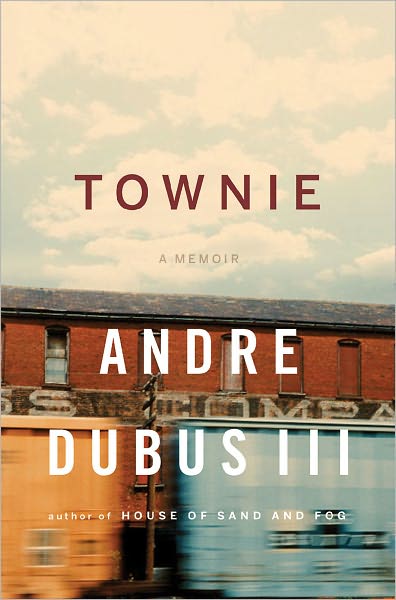 W.W. Norton & Company 2011
W.W. Norton & Company 2011
I haven’t spoken to my dad in more than twenty years. Of course he hasn’t contacted me either, but I suspect that this may be my life’s regret. My parents divorced when I was two, and Mom was awarded sole custody. But when my brother was eleven and I was nine, we lived briefly with Dad because Mom was homeless. Once we were sheltered, Mom moved to Wisconsin to follow a lover and to find work and a home. Six months later we told Dad we wanted to live with Mom, so he drove us all night from Indiana, dropped us at her doorstep, and told her he never wanted to see her again. I don’t remember what he said to me.
So when I read Townie by Andre Dubus III, I felt a twinge of jealousy. While we are both children of divorced parents and poverty despite a hardworking single mother, our similarities end there. He spends his adolescence on the streets of Haverhill, Massachusetts, along the Merrimack River getting stomped by neighborhood bullies and watching his brother and friends endure the same, feeling helpless. That is, until he begins body building and boxing. His fighting fantasies, which involve pummeling people the way movie character Dirty Harry does, become reality. Dubus transforms himself into a sort of anti-bully. He nearly kills a guy who knifes a friend: “I straddle him and keep punching him in the skull, the ear, the temple, his bare hands, his neck…And I’m standing and kicking him in the head…and his head keeps bouncing back and rolling forward….” He believes he protects but finally realizes that eventually he will either kill or be killed.
Violence seems intricately woven into Dubus’s relationship with his father. A prolific short story writer, Andre Dubus II lived just across the Merrimack River and taught at Bradford College. He visited his children on Sundays, sometimes only monthly, and refused to acknowledge his family’s privation. During one visit, he’s incredulous when thirteen-year-old Andre asks him who the Boston Red Sox are. Dubus writes, “He smiled as if I’d just told a joke, and he turned up the radio. But I wasn’t joking.” They lived in separate worlds—the father’s civilized, the son’s brutal—revealing that Townie is partly a memoir about how place can shape a person into something as cruel or sophisticated as itself.
Dubus is neither vengeful nor sentimental about his mean childhood or his father’s self-imposed ignorance. Their lives are simply different, though Dubus cannot confront his father with obvious questions like, “Why didn’t you take me to a baseball game?” He assumes it cost too much. Instead he comes to terms with it by building a relationship with his dad.
So why am I envious? Unlike Dubus, I know nothing of my father’s life. When Dubus discovers that writing is as therapeutic as fighting, it is an intersection at which father and son meet. Father imparts encouragement and skill. And following an accident, Son imparts the same by teaching and helping his father strengthen his body. Dubus writes, “I imagined that helping Pop get his strength back gave the kind of sustained creative satisfaction a gardener must feel, or a coach, or a father.”
Dubus makes me believe I might find a crossroads with my own father.
—
Jennifer Ochstein is a creative nonfiction MFA student at Ashland University in Ohio. She also teaches writing at Bethel College in Indiana. She is currently working on a memoir about the intersection and evolution of faith from childhood to adulthood.
